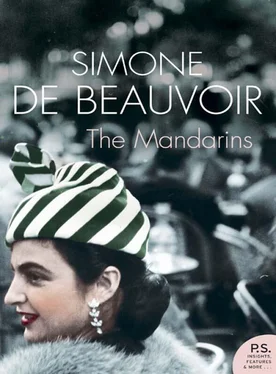SIMONE DE BEAUVOIR
The Mandarins
Translated by Leonard M. Friedman
With an introduction by Doris Lessing

COPYRIGHT Copyright Dedication Introduction Chapter One Chapter Two Chapter Three Chapter Four Chapter Five Chapter Six Chapter Seven Chapter Eight Chapter Nine Chapter Ten Chapter Eleven Chapter Twelve P. S. Ideas, Interviews & Features … About the Author Biography Did You Know? About the Book Equals Not Sequels After the War: The Intellectual ‘Mandarins’ of Paris Life Read On If You Liked This, You Might Like … About the Author By the Same Author About the Publisher
Harper Perennial
An imprint of HarperCollins Publishers 1 London Bridge Street London SE1 9GF
http://www.harpercollins.co.uk
This Harper Perennial Modern Classics edition published in 2005
Harper Perennial
Previously published in paperback by Flamingo 1993 (as a Flamingo Modern Classic) and 1984 (reprinted five times)
First published in France in 1954 by Librairie Gallimard
under the title Les Mandarins First English translation published in Great Britain by Collins 1957
Copyright © Librairie Gallimard 1954
English translation copyright © Collins 1957
Introduction copyright © Doris Lessing 1993
PS section copyright © Jon Butler 2005 except ‘Equals Not Sequels’ by Kathy Lette
© Kathy Lette 2005
PS™ is a trademark of HarperCollinsPublishers Ltd
A catalogue record for this book is available from the British Library
This novel is entirely a work of fiction. The names, characters and incidents portrayed in it are the work of the author’s imagination. Any resemblance to actual persons, living or dead, events or localities is entirely coincidental.
All rights reserved under International and Pan-American Copyright Conventions. By payment of the required fees, you have been granted the nonexclusive, nontransferable right to access and read the text of this e-book on-screen. No part of this text may be reproduced, transmitted, downloaded, decompiled, reverse engineered, or stored in or introduced into any information storage and retrieval system, in any form or by any means, whether electronic or mechanical, now known or hereinafter invented, without the express written permission of HarperCollins e-books.
Ebook Edition © MAY 2018 ISBN 9780007405589
Version: 2018-05-16
HarperCollinsPublishers has made every reasonable effort to ensure that any picture content and written content in this ebook has been included or removed in accordance with the contractual and technological constraints in operation at the time of publication.
DEDICATION Dedication Introduction Chapter One Chapter Two Chapter Three Chapter Four Chapter Five Chapter Six Chapter Seven Chapter Eight Chapter Nine Chapter Ten Chapter Eleven Chapter Twelve P. S. Ideas, Interviews & Features … About the Author Biography Did You Know? About the Book Equals Not Sequels After the War: The Intellectual ‘Mandarins’ of Paris Life Read On If You Liked This, You Might Like … About the Author By the Same Author About the Publisher
To Nelson Algren
Title Page SIMONE DE BEAUVOIR The Mandarins Translated by Leonard M. Friedman With an introduction by Doris Lessing
Copyright
Dedication
Introduction
Chapter One
Chapter Two
Chapter Three
Chapter Four
Chapter Five
Chapter Six
Chapter Seven
Chapter Eight
Chapter Nine
Chapter Ten
Chapter Eleven
Chapter Twelve
P. S. Ideas, Interviews & Features …
About the Author
Biography
Did You Know?
About the Book
Equals Not Sequels
After the War: The Intellectual ‘Mandarins’ of Paris Life
Read On
If You Liked This, You Might Like …
About the Author
By the Same Author
About the Publisher
INTRODUCTION
by Doris Lessing
Even before The Mandarins arrived in this country it was being discussed with the lubricious excitement used for fashionable gossip. Everyone knew the novel was about the political and sexual lives of Jean-Paul Sartre and Simone de Beauvoir and their friends, a glamorous group for several reasons. First, they were associated with the French Resistance, and of all the heroic myths of the Second World War the Resistance was the most potent. Then, they were French, and it is hard now to explain the degree of attractiveness France had for the British after the war. It was only partly that we knew our cooking and our clothes to be inferior, that they had a style and panache we lacked. The British had been locked up in their island for the long years of the war, could not refresh themselves outside it, and France wore the features of some forbidden Paradise. And, too, intellectual communism, intellectuals generally, were glamorous in a way they never have been here, not least because what The Mandarins were debating along the Left Bank were questions about the Soviet Union scarcely acknowledged in socialist circles here, or, if so, only in lowered voices. There was another reason why The Mandarins was expected to read like a primer to better living, and that was the relationship between Sartre and de Beauvoir, presented by them, or at least by Sartre, as exemplary. It was close and matey, like a marriage, but without the legalities and obligations of one, while both partners had absolute freedom to pursue sexual adventures they fancied. This arrangement, needless to say, appealed particularly to men, and innumerable sceptical women were lectured by actual or possible mates on how they should take a lesson from Simone, a woman above the petty jealousies that disfigure our sex. As it turned out, women were right to be sceptical, but there was for us too an attraction in that comradely relationship over there in Les Deux Magots and the Flore , where Jean-Paul and his long-term woman Simone together with all his petites amies , where Simone and her steady, Jean-Paul, and her other little loves, male and female, all forgathered daily to partake of lofty intellectual fare, watched by hundreds of reverential disciples. But it turned out there was nothing of this ideal relationship in the novel, and the Simone figure, Anne, was presented as a dry and lonely woman, in a companionable marriage, resigned to early middle age.
Sartre then stood for an adventurous optimism about science. There was a film about him, showing him stepping out of a helicopter, then the newest of our toys, hailing the brave new world of technology, the key to unlimited progress. We needed this kind of re-evaluation, after watching for the years of the war how war used our inventions and discoveries for destruction.
And then, there was Existentialism. Just as most communists had never read more of Marx than The Communist Manifesto , most people attracted by Existentialism had read Sartre’s plays and novels. Thus diluted, it was agreeable latter-day stoicism that steadily confronted the terrors of the Universe while refusing the weakminded consolations of religion; courageous, solitary, clear-minded.
The Left Bank was, quite simply, the intellectual centre of the world, no less, and here was The Mandarins , a guide to it written by one of its most glittering citizens.
But Paris was only the half of it. Simone de Beauvoir had had a much publicized affair with Nelson Algren, and the novel describes it. Algren, then, was famous for The Man with the Golden Arm , and A Walk on the Wild Side , cult novels romanticizing the drug and crime cultures of big American cities. Drugs, crime and poverty were as glamorous as, earlier, had been La Vie Bohème with its TB, its drunkenness, the misery of poverty. The bourgeoisie have always loved squalor – in fiction. (In those days the words bourgeoisie, bourgeois, petit-bourgeois tripped off all our tongues a dozen times a day, but now it is hard to use them without being overcome by staleness, by boredom.) To be bourgeois was bad, middle-class values so disgusting that people dying of drugs, or in prison for selling drugs, or with lives wasted by poverty were in every way preferable, full of poetry and adventure that cocked a snook at capitalism and the middle class. Where Simone de Beauvoir loved and was loved by Nelson Algren it was the symbolical mating of worlds apparently opposite but linked by a contempt for the established order, and a need to destroy it.
Читать дальше













